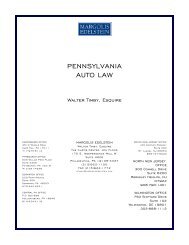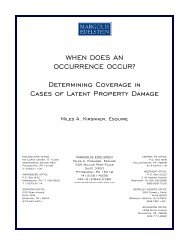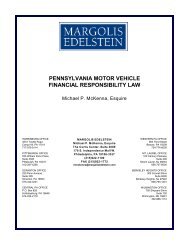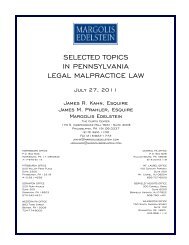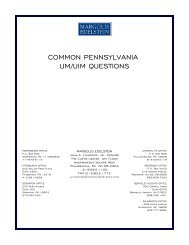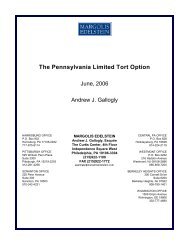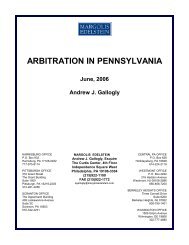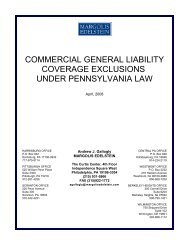recent developments in pennsylvania medical malpractice law
recent developments in pennsylvania medical malpractice law
recent developments in pennsylvania medical malpractice law
You also want an ePaper? Increase the reach of your titles
YUMPU automatically turns print PDFs into web optimized ePapers that Google loves.
B.K. v. Chambersburg Hospital, 834 A.2d 1178 (Pa. Super. 2003), app. den’d, 847 A.2d 1276(Pa. 2004), it was held that the trial court could not preclude a doctor who wasn’t an emergencymedic<strong>in</strong>e physician from testify<strong>in</strong>g <strong>in</strong> an emergency room case s<strong>in</strong>ce the doctor did have tra<strong>in</strong><strong>in</strong>g <strong>in</strong>emergency room medic<strong>in</strong>e and this gave him enough of a basis to testify. However, <strong>in</strong> Yacoub v.Lehigh Valley Medical Associates, 805 A.2d 579 (Pa. Super. 2002), app. den’d, 825 A.2d 639 (Pa.2003), the Superior Court affirmed the trial court decision preclud<strong>in</strong>g a neurosurgeon from testify<strong>in</strong>gabout the standard of care of nurses and an <strong>in</strong>ternist <strong>in</strong> a hospital. In Rose v. Annabi, 2007 Pa. Super.308 (Pa. Super. 2007), preclusion of an expert was upheld where there was no testimony presented toshow substantially similar standard of care between two specialties.An expert must possess a <strong>medical</strong> license at the time of trial to be qualified to testify even if theexpert were licensed when the negligence occurred. Est. of We<strong>in</strong>er v. Fisher, 871 A.2d 1283 (Pa.Super. 2005); Bethea v. John F. Kennedy Memorial Hospital. 871 A.2d 223 (Pa. Super. 2005). InGeorge v. Ellis, 923 A.2d 1174 (2006), the Superior Court affirmed the trial court’s preclusion of anexpert who practiced <strong>in</strong> Canada and not the United States. An expert who can practice only underprobationary terms from his state <strong>medical</strong> board is not considered as hav<strong>in</strong>g an “unrestricted” licenseas required <strong>in</strong> § 512 and therefore may not testify. Cim<strong>in</strong>o v. Valley Family Medic<strong>in</strong>e, 912 A.2d 851(Pa. Super. 2006).The rule has been applied <strong>in</strong> a federal court. Miville v. Ab<strong>in</strong>gton Memorial Hosp., 377 F.Supp.2d 488, recon. den’d, 2005 U.S. Dist. LEXIS 17153 (E.D. Pa. 2005).10. Statute of reposeA new § 1303.513, effective only to causes of action aris<strong>in</strong>g on or after March 20, 2002,creates a seven-year statute of repose. This bars commencement of a <strong>law</strong>suit more than seven yearsafter the date of the alleged tort. This applies even when the <strong>in</strong>jury was discovered later, thus limit<strong>in</strong>gthe application of the discovery rule. However, this statute does not apply to foreign objects left <strong>in</strong> thepatient’s body or where there was affirmative misrepresentation or fraudulent concealment of the causeof death <strong>in</strong> the case of a wrongful death action. Also, it does not apply to m<strong>in</strong>ors who still may sueuntil their 20th birthday.11. VenueAnother section, § 1303.514, requires the creation of a Commission on Venue which has nowresulted <strong>in</strong> the change <strong>in</strong> civil rules described above.12. RemittiturIn assign<strong>in</strong>g a request for remittitur, that is, a reduction <strong>in</strong> the amount of a verdict, the trial courtmay consider the effect on the availability or access to health care <strong>in</strong> the community, and that trial courtcan be reversed if it could not take evidence on this subject. A trial court may also limit the amount-9-



